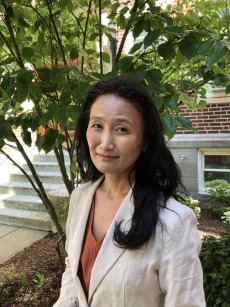
Kaoru Hayashi is a scholar of premodern Japanese literature, specializing in classical tales. Her areas of research interest also include premodern Japanese history and religious studies, area studies, and modern film and mass media. Her book project, “Mediating Spirits: Narratives of Vengeful Spirits and Genealogies in Premodern Japanese Literature,” explores the invocation of the angry dead both as a social practice of genealogical imagination repeatedly thematized within premodern Japanese literary texts and as an act whose structure generated a narrative voice integral to the development of classical Japanese narratives. Hayashi received her M.A. and Ph.D. in East Asian Studies from Princeton University and B.A. in East Asian Languages and Literatures from Smith College. Before joining the University of Arizona, she was an Assistant Professor at Texas State University, and spent one year as a postdoctoral fellow at the Reischauer Institute of Japanese Studies at Harvard University.

